War In Middle East Is A Serious Possibility - Expert
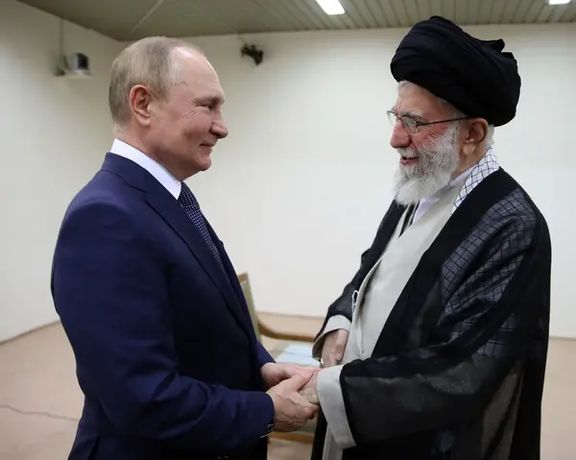
Iran’s march toward nuclear weapons and its deepening alliance with Russia is driving the Middle East closer to war, a scholar has argued in the Wall Street Journal.

Iran’s march toward nuclear weapons and its deepening alliance with Russia is driving the Middle East closer to war, a scholar has argued in the Wall Street Journal.
Walter Russel Mead, Distinguished Fellow in Strategy and Statesmanship at the Hudson Institute, after a trip to Israel says that the Biden administration faces a serious challenge by the revisionist states of Russia, China and Iran that want to weaken US power and influence.
“For Mr. Putin, a major military confrontation in the Middle East would be an unmitigated blessing. Oil prices would spike, filling Moscow’s coffers and intensifying pressures on Europe, Mead argues, adding that in case of a regional war “The Pentagon would have to split available weapons between Ukraine and Middle East allies.”
The Biden administration and European powers have expressed deep concern over Iran’s growing military ties with Russia. They have said that a resumption of nuclear talks with Tehran is contingent on its change of policy in supplying weapons to Moscow. Iran has so far supplied hundreds of kamikaze drones to Russia that are used against Ukraine.
Mead also warns that Putin might decide to strengthen Iran’s military, “limiting Israel’s ability to attack Iran’s nuclear facilities,” which “could force Israel into a pre-emptive strike” and a regional war.
He also argues that a “hawkish Middle East posture” by the United States could deter Russia and Iran, but that is what “many Democrats—including senior Biden officials—viscerally loathe.”
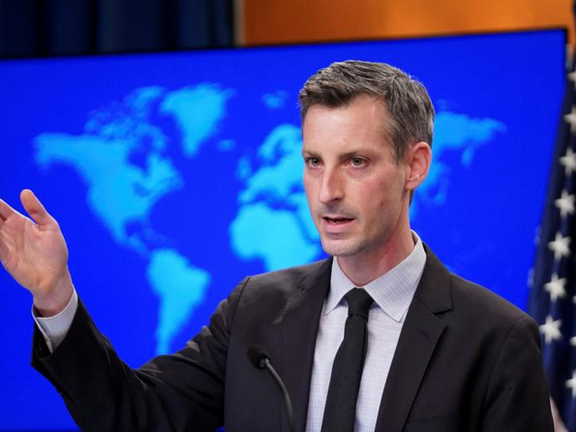
US State Department Spokesperson Ned Price says Tehran lies about receiving messages from Washington about resuming negotiations over the nuclear deal.
During a briefing on Monday Price said he cannot answer why time to time Iranian officials claim that the US is interested in resuming nuclear talks and sends messages in this regard.
“Only Iranian officials can speak to why they continue to tell these lies. Iranian officials can repeat their line as often as they want, but it doesn’t change the underlying facts. A revival of the JCPOA has not been on the agenda for months. We have not conveyed any message to the contrary. I can’t speak to why Iranian officials may be trying to deceive the rest of the world,” noted Price.
The Iranian foreign minister’s claims came as Iran’s currency, the ria,l dropped to unprecedented lows on Sunday, creating more panic in the country. Optimistic statements about the likelihood of a nuclear deal and lifting of sanctions usuallu help the Iranian currency to rally.
Elsewhere in his remarks, Price referred to Iranian Foreign Minister Hossein Amir-Abdollahian’s statements at the UN Human Rights Council on Monday, saying his appearance in the human rights council serves as a “disturbing reminder to the world of the hypocrisy of the Iranian regime….In light of this, we did not have our ambassador in the chair when Iran spoke.”
Responding to Amir-Abdollahian’s comments, who said in his remarks on Monday that “Human rights is at the – are at the core of our values;” and “No state should coerce others to self-styled interpretation of human rights,” Price stated that this is an excuse often heard from countries with the worst human rights records around the world, claiming that human rights are subjective, and they need to be context-dependent.
“Iran is a member-state of the UN. The UN Charter is predicated on some of the same ideals that are in the Universal Declaration of Human Rights, the idea of universal rights around the world. Iran can’t have it both ways. Iran cannot purport to be a member, a member-state of the UN, while making these arguments that these universal rights don’t apply to the people of Iran,” stressed Price.
Tens of participants at the UN Human Rights Council walked out when the Islamic Republic’s foreign minister spoke at the 52nd session of the body on Monday.
Many seats were empty while Hossein Amir-Abdollahian was delivering his speech at UHRC’s headquarters in Geneva, following calls by activists urging delegates to walk out in reaction to the regime’s gross human rights violations, especially during the ongoing crackdown on antigovernment protests.
Trying to manipulate the realities on the ground, the Iranian FM said, “The peaceful assemblies that took place in my country following the sad death of Mahsa Amini... turned violent following the malign interference by some terrorist elements. In this respect, several Persian language TV channels based in the US and the UK, acted as provocateurs of hatred and propagators of violence.”
He also claimed that an investigation was ongoing and that all the people that were arrested during the protests have been released. He also claimed that "no one has been killed," in response to Iran International’s correspondent who asked him about the Islamic Republic's killing of protesters including a 10-year-old kid.
The council was one of the first international bodies to react to the current wave of protests. In November, the council voted to launch an independent investigation into the regime’s deadly repression, which has killed more than 500 civilians, including 70 children.
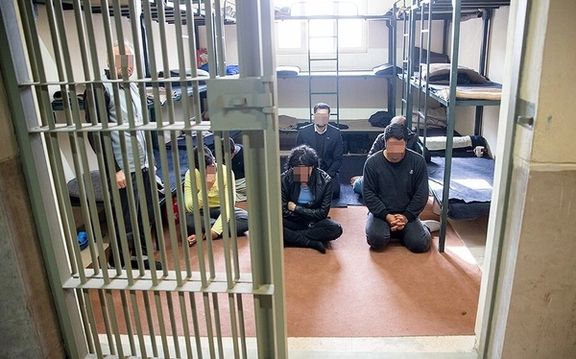
PEN International and 35 other centers in the PEN literary and free expression network have condemned the detention and suppression of writers, poets and members of the Iranian Writers' Association.
In a statement published on Monday, they also demanded the immediate release of all those who are imprisoned after they protested, wrote or translated books and fought censorship.
“We call for the Iranian authorities to cease harassing and investigating members of the IWA, and unconditionally drop all politically-motivated charges against these writers,” reads the statement.
The Iranian regime intensified arrests of prominent writers and other artists, including award-winning filmmakers last year and especially after popular antigovernment protests broke out in September.
In another part of the statement, the signatories said they stand in solidarity with all writers in Iran and call for an end to the “severe” and “protracted” government crackdown on writers and the entire creative sector.
“We call for all writers jailed for their peaceful expression and words to be freed immediately and unconditionally, and for the international community and multilateral institutions such as the United Nations to pay special attention to the targeting of writers and the creative community in Iran.”
According to PEN America’s 2021 Freedom to Write Index Iran jailed the fourth highest number of writers and public intellectuals in the world and in 2022, arrests of writers and other artists have spiked dramatically.

Amnesty International says Iranian authorities are subjecting Belgian aid worker Olivier Vandecasteele to enforced disappearance, torture and other ill-treatment.
In a statement released on Monday, Amnesty International urged all states whose nationals are or have been detained at any point in Iran to promptly examine whether the deprivation of liberty amounts to an act of hostage-taking, and if so, take all appropriate measures to ensure accountability.
“He is held in solitary confinement in a windowless basement cell and is denied access to adequate healthcare and fresh air,” added Amnesty.
Additionally, his family and lawyer, as well as Belgian consular authorities, are unaware of his exact whereabouts.
Amnesty has warned that the Islamic Republic of Iran has kept this Belgian citizen as a "hostage" to exchange him with Asadollah Asadi, an Iranian diplomat.
Asadi has been sentenced to 20 years in prison for “attempted murder and involvement in terrorism” for his role in plotting to bomb a gathering of the MEK near Paris in 2018.
On 10 January 2023, Iranian state media announced that Vandecasteele was sentenced to 40 years in prison and 74 lashes, amidst indications that the Iranian authorities are holding him hostage to compel Belgian authorities to swap him for a former Iranian official imprisoned in Belgium.
Currently, at least 16 foreign citizens, most of whom dual nationals, are detained in the prisons of the Islamic Republic.
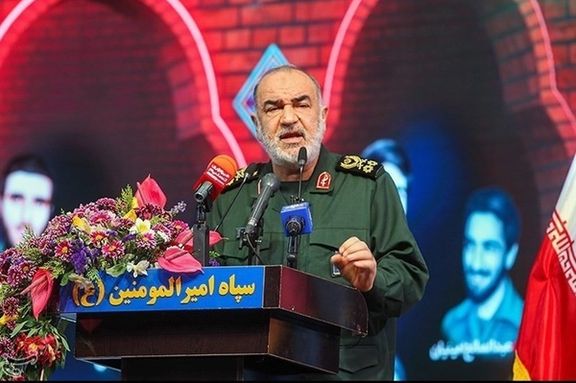
Commander of Iran’s Revolutionary Guard has threatened European countries that the Islamic Republic can target them by increasing the range of its weapons.
In remarks in the southern city of Abadan on Monday, the IRGC commander Hossein Salami said Europe is a pioneer in imposing sanctions against the Iranian people, and European countries have become a place for gatherings of “anti-Iranian separatists and fugitives”.
“We have the ability to increase the range of weapons and strike them seriously, but we have not yet done so,” he added.
“We warn them. The lives of Europeans depend on oil and security, and they should be careful and not endanger themselves.”
Elsewhere in his remarks, Salami stated that Westerners have done everything they could against Iran, but they must know that “we have found our way and our will is to create security, but the Europeans should be careful and not abuse our [kind] behavior.”
The threats by Salami come in a situation that EU officials are still hesitant to designate the IRGC as a terrorist group.
EU Foreign Policy Chief Josep Borrell has said the European Union cannot list Iran's IRGC as a terrorist entity until an EU court has determined that they are.
The European Parliament has called on the EU to list the Revolutionary Guards as a terrorist entity, blaming it for the repression of domestic protests and the supply of drones to Russia.
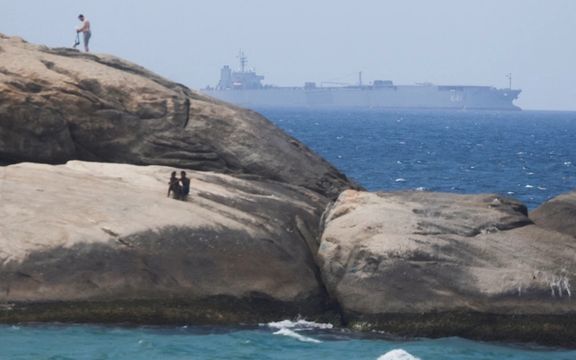
Two Iranian warships docked in Rio de Janeiro on Sunday the government granted permission despite pressure from the United States to bar them.
The IRIS Makran and IRIS Dena warships both arrived on Sunday morning, Rio's port authority said in a statement.
Reuters earlier this month reported that Brazil had bowed to US pressure and declined Iran's request for the vessels to dock in Rio in late January, in a gesture from Brazilian President Luiz Inacio Lula da Silva as he flew to Washington to meet US President Joe Biden.
However, with Lula's trip over, the ships have been allowed to dock. Vice Admiral Carlos Eduardo Horta Arentz, the deputy chief of Brazil's Naval Staff, gave his approval for the ships to dock in Rio between February 26 and March 4.
The presence of the Iranian warships on Brazilian shores continues to irk the United States as it seeks to build closer ties with Lula's administration, which came into office on January 1.
In a February 15 press conference, US Ambassador Elizabeth Bagley urged Brazil not to allow the ships to dock.
"In the past, those ships facilitated illegal trade and terrorist activities, and have also been sanctioned by the United States. Brazil is a sovereign nation, but we firmly believe those ships should not dock anywhere," she said.
Diplomacy with Iran was one of the highlights of Lula's attempts to bolster Brazil's international standing during his previous presidential terms. He traveled to Tehran to meet then-President Mahmoud Ahmadinejad in 2010 as he sought to broker a nuclear deal between Iran and the United States.